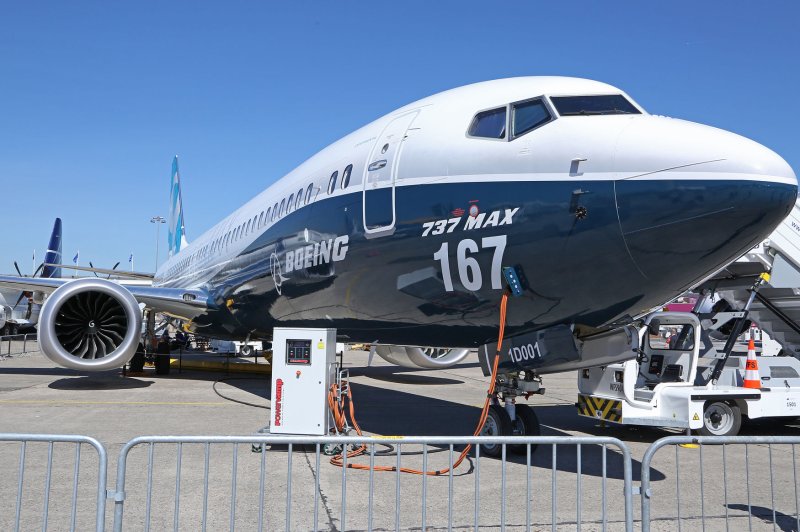Boeing CEO Dennis Muilenburg said Wednesday he'd put his own family aboard a 737 Max "without hesitation." File Photo by David Silpa/UPI |
License Photo
May 30 (UPI) -- In his first remarks to news media about two deadly crashes involving his company's planes, Boeing CEO Dennis Muilenburg apologized to the victims' families.
Muilenburg has been highly visible over the last few months following the crashes of two Boeing 737 Max 8 aircraft that killed a combined 346 people. The Max 8 and Max 9 have been grounded worldwide since March while investigators identify the causes and Boeing finalizes a software fix for the airliners' automated flight systems.
Muilenburg apologized to the victims' families in a video message last month, but Wednesday was the first time he spoke to news media. The Boeing chief told CBS News the 737 Max will be safe when it returns to the skies, and said he'd put his own family on one of the planes "without hesitation."
"I do personally apologize to the families," Muilenburg said. "We feel terrible about these accidents. We apologize for what happened. We are sorry for the loss of lives in both accidents, and that will never change. That will always be with us. I can tell you it affects me directly as a leader of this company, it's very difficult."
Boeing and the Federal Aviation Administration have been under scrutiny for how the anti-stall system and warnings for pilots on the 737 Max were implemented and tested. Investigators have said sensors on both downed planes fed the flight system inaccurate data.
"We know there was inaccurate sensor data that came into the airplane and there appeared to be a maintenance issue with that sensor," Muilenburg said. "The implementation of that software, we did not do it correctly. Our engineers discovered that. We are fixing it now, and our communication on that was not what it should have been."
The airplane manufacturer said this month it knew for more than a year a cockpit alert wasn't working properly. If the angle-of-attack sensors had conflicting data, the alert was supposed to go off before the airplane automatically went into a steep dive to avoid a stall.
"We clearly fell short and the implementation of this angle-of-attack disagree alert was a mistake, right, we did not implement it properly," Muilenburg said. "We're confident in the fundamental safety of the airplane."
"We know ... the public's confidence has been hurt by these accidents and that we have work to do to earn and re-earn the trust of the flying public, and we will do that," Muilenburg told an investor conference earlier Wednesday. "We are taking all actions necessary to make sure that accidents like those two ... never happen again."















